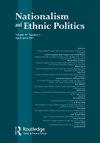日本移民融合的观念模型:政策框架动态的多标量方法
IF 1.1
Q3 ETHNIC STUDIES
引用次数: 0
摘要
摘要本文基于多尺度研究设计,探索日本移民融合政策框架。移民融合框架的发展反映了一个过程,即地方规模对基于“多元文化共存”概念的国家政策的发展作出了贡献。在移民改革的推动下,中央政府巩固了国家框架,加强了对移民融合治理的参与,转向更经济的移民框架。虽然爱知县、名古屋和丰田市(位于爱知县)的案例反映了框架与国家层面的逐渐趋同,但京都县和京都市的政策并没有反映这种变化。令人惊讶的是,位于京都县的京丹市已经从国家层面的政策转向更经济的移民框架。对政策制定中的“关系”和利益相关者以及不同治理规模之间关系的关注表明,将其优先事项带到讨论桌上的地方政治行为体的集合是地方政策框架制定的重要塑造力量。与此同时,即使在没有正式协调机制的情况下,横向和纵向网络的交流也表现出思想流通的活力。本文章由计算机程序翻译,如有差异,请以英文原文为准。
Ideational Models of Immigrant Integration in Japan: A Multi-Scalar Approach to the Dynamics of Policy Frames
Abstract This article explores migrant integration policy frames in Japan based on a multi-scalar research design. The development of migrant integration frames mirrors a process where the local scale has contributed to the development of a national policy based on the concept of “multicultural coexistence.” Under the impulsion of immigration reforms, the central government has consolidated the national framework and strengthened its involvement in the governance of migrant integration turning to a more economic framing of migrants. While the cases of Aichi prefecture and Nagoya and Toyohashi cities (located in Aichi prefecture) reflect a gradual convergence of frames with the national level, policies in Kyoto prefecture and Kyoto city do not echo such shifts. Surprisingly, Kyotango city located in Kyoto prefecture has drawn on national level policies turning to a more economic framing of migrants. A focus on “relationality” and stakeholders in policy formulation and relationships between different scales of governance suggests that the assemblage of local political actors bringing their priorities to the discussion table are important shaping forces of local policy frame development. At the same time, exchanges in horizontal and vertical networks exhibit the vitality of the circulation of ideas, even in the absence of formal coordination mechanisms.
求助全文
通过发布文献求助,成功后即可免费获取论文全文。
去求助
来源期刊

Nationalism and Ethnic Politics
ETHNIC STUDIES-
CiteScore
1.30
自引率
0.00%
发文量
30
期刊介绍:
Nationalism & Ethnic Politics explores the varied political aspects of nationalism and ethnicity in order to develop more constructive inter-group relations. The journal publishes case studies and comparative and theoretical analyses. It deals with pluralism, ethno-nationalism, irredentism, separatism, and related phenomena, and examines processes and theories of ethnic identity formation, mobilization, conflict and accommodation in the context of political development and "nation-building". The journal compares and contrasts state and community claims, and deal with such factors as citizenship, race, religion, economic development, immigration, language, and the international environment.
 求助内容:
求助内容: 应助结果提醒方式:
应助结果提醒方式:


